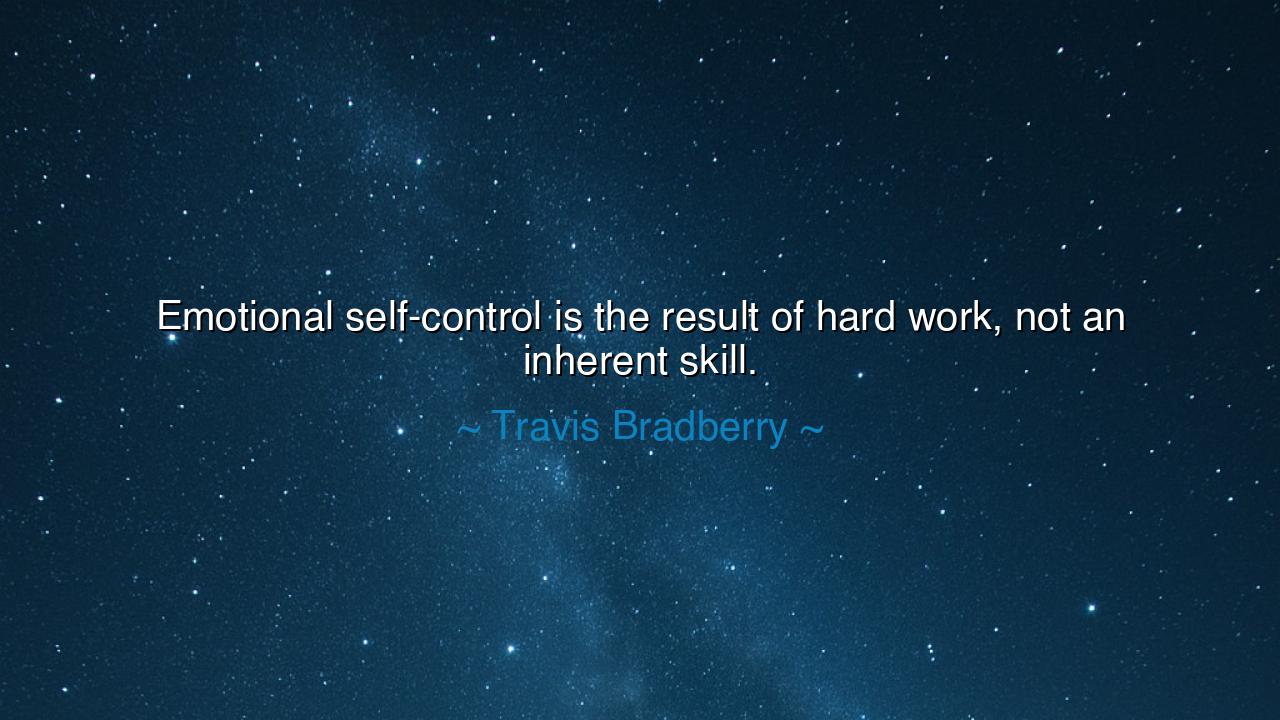
Emotional self-control is the result of hard work, not an






Hear these words, children of tomorrow, for they are the counsel of those who have walked long upon the earth. Emotional self-control is not a gift bestowed at birth, nor a jewel hidden within the heart waiting to be uncovered. It is a treasure forged in the fire of struggle, hammered upon the anvil of discipline, and polished through the years of patient endurance.
The sage Travis Bradberry declares with clarity: it is the fruit of hard work, not the inheritance of nature. For no man is born with mastery over his passions, just as no blade is born sharp. The iron must be refined, the edge must be whetted, and the hand must learn the steady grip. So too must the soul be tempered, if it is to rule its storms rather than be ruled by them.
Be not deceived, O traveler of life, by the thought that others possess this strength by chance. Their calmness is not mere fortune, but the harvest of countless battles fought within. They have stumbled, they have risen, and they have carved from their trials the strength to remain unmoved when the winds of anger or sorrow howl. The discipline of the heart is won only through labor, as the farmer wins his grain by toil beneath the sun.
Therefore, let this teaching be your guide: do not wait idly for serenity to descend upon you, but labor daily to cultivate it. Train the spirit as one trains the body; restrain the tongue, quiet the breath, and weigh each thought before action. In time, your heart shall learn its own strength. And when the storms come—and they shall surely come—you will stand unshaken, a pillar of calm amid the tempest.






HYDinh Hoang Yen
Travis Bradberry’s insight on emotional self-control being a result of hard work makes me think about how we often view emotional intelligence. If it’s not something we’re born with, but something we develop, does that mean anyone can become emotionally self-regulated with enough effort? What tools or techniques can we use to make emotional self-control a habit, and how long does it take to see significant changes in ourselves?
GHGam Hong
Bradberry’s statement about emotional self-control being hard work instead of an inherent trait is a relief for many people who struggle with their emotions. It implies that emotional regulation is within our control if we put in the effort. But how do we break the cycle of emotional reactivity and train ourselves to respond more thoughtfully? Can small, incremental changes really lead to long-term emotional growth, or does it require a complete mindset shift?
ATTran Phuoc Anh Thien
Travis Bradberry’s quote about emotional self-control being earned rather than innate challenges the idea that emotional intelligence is a trait that can’t be developed. It makes me wonder—how often do we underestimate our own potential for growth in this area? If emotional self-control is the result of consistent practice, could this be something that we all can improve over time? How can we start integrating these efforts into our daily lives for better emotional regulation?
TPle tien phuong
Bradberry’s point about emotional self-control being the result of hard work resonates with me. It’s often easy to let our emotions take over, especially in stressful situations. The idea that we can improve our emotional regulation with effort is both encouraging and daunting. How do we start practicing emotional self-control, especially when emotions are running high? Are there particular exercises or mindsets that can make this process easier?
HAHa Anh
I agree with Travis Bradberry that emotional self-control doesn’t come naturally to everyone. It’s easy to think that some people are just naturally good at handling their emotions, but this quote suggests that it’s something we can all improve. How much of emotional self-control comes from learned techniques versus natural predispositions? What are some practical steps we can take to work on this aspect of our emotional intelligence?